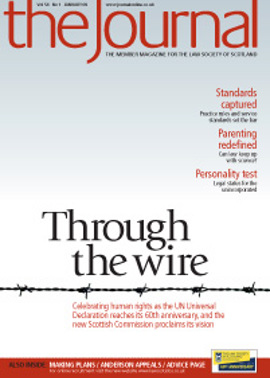Front of the class

On the coming into force of the Education (Additional Support for Learning) (Scotland) Act 2004, the Scottish Executive committed to a review of its implementation after two years. Her Majesty’s Inspectorate of Education (HMIE) prepared a report on the implementation of the Act, which was published at the end of 2007.
Following that, the Scottish Government consulted on a draft bill and subsequently published the Education (Additional Support for Learning) (Scotland) Bill on 6 October 2008. The bill is a relatively short one (just 10 sections in all), but it does deal with some important issues, particularly in relation to cross-boundary placements (i.e. children who live in one local authority area, but attend a school in a different local authority area).
Extending the tribunal’s reach
Section 1 of the bill deals with placing requests. The purpose of this section is to reverse the effect of two Court of Session decisions, which had interpreted the 2004 Act in a way in which the Scottish Government had not intended.
In Gordon, Appellant [2007] FamLR 76, Lady Dorrian had determined that s 18(4) of the 2004 Act meant that the additional support needs tribunal only had jurisdiction to hear an appeal against a placing request if the authority had decided that the child in question required a co-ordinated support plan (CSP) prior to refusing the placing request. Where, as in the facts of this case, the decision to open a CSP came after the refusal of the placing request, the parent’s right of appeal was to the education appeal committee (with a possible further right of appeal to the sheriff).
Section 1 seeks to undo this ruling, by amending the legislation so that appeals will go to the tribunal where the decision to open a CSP is taken at any time up to the lodging of an appeal reference at the tribunal. The time limit for lodging a reference is two months (compare that with the 28-day deadline for education appeal committee appeals).
Furthermore, the bill provides for the transfer of an appeal from the education appeal committee or sheriff court to the additional support needs tribunal in circumstances where the decision to open a CSP – or even a decision to formally consider whether a CSP is required or not – is taken at any point before final disposal of a case by the sheriff (or appeal committee). If, subsequently, the authority (or tribunal) decides that a CSP is not required, the appeal can be referred back to the education appeal committee or sheriff court from whence it came, although there is a discretion on the part of the tribunal to retain the case.
It is fair to say that these provisions are somewhat complex and involved.
Placing beyond your area
The second case which s 1 proposes to deal with is WD v Glasgow City Council 2007 SC 11, a decision of the Inner House which attracted a healthy dose of public and press attention at the time. The First Minister issued an almost immediate commitment to overturn the decision if the House of Lords did not do so (in fact, the appellant was refused legal aid to appeal).
In this case, the Inner House decided that the 2004 Act did not permit the parent of a child with additional support needs to make a placing request to a school which was managed by an education authority elsewhere in Scotland. That is, the right to make a placing request was restricted (as far as public schools were concerned) to schools within your own local authority area.
This was a particularly troubling decision, since the parents of children who do not have additional support needs continue to enjoy a right to make this kind of cross-boundary placing request.
Section 1 therefore would amend the legislation to permit a placing request to any local authority school in Scotland, whether the parent resides in that area or not. In the event that such a placing request is refused, amendments are proposed which would allow the additional support needs tribunal the jurisdiction to hear an appeal (subject to the ordinary rules regarding the child having a CSP, or a decision to open one etc: see above).
More smoothing out
Sections 2 and 3 respectively extend the rights of parents to access the remedies of mediation and dispute resolution, so that the parent can make use of them even if their child attends an education authority school which is not in their own local authority area. This is currently not provided for by the 2004 Act.
Section 4 deals with inter-authority payments. Section 23 of the Education (Scotland) Act 1980, as amended, provides that where a child attends a school in another local authority area, the “home” local authority has to make payments to the “host” local authority to reimburse them for the cost of any additional support provided for that child. This approach was recently confirmed by Lord Penrose in the case of East Renfrewshire Council v Glasgow City Council [2008] CSOH 175. This section inserts a new subs (2A) to s 23 of the 1980 Act, clarifying that this duty to reimburse does not include a duty to refund costs incurred by authorities in respect of mediation or dispute resolution.
Section 5 amends s 29 of the 2004 Act, the interpretation section. In particular it seeks to clarify which authority is responsible for a child’s school education in circumstances where one education authority has made arrangements for a child to be educated in a school managed by another education authority. The answer? The authority to whose area the child belongs (i.e. the authority where the child’s parent(s) live). Of course, this apparently simple solution is complicated somewhat if the child has more than one parent and those parents live in different authority areas.
Section 6 tidies up a couple of loose ends by allowing a parent to refer matters relating to the opening of a CSP to the additional support needs tribunals where progress has stalled by the failure of an education authority to take a decision at all. It does this by treating a failure to take certain decisions on whether a child requires a CSP or not within the specified time limits as a decision that the child does not require a CSP at all. The 2004 Act already allows a parent to appeal against such a decision to the tribunal.
Section 7 adds to the Scottish Ministers’ powers to create and amend the rules of the tribunal, and will allow them to provide for appeals on missed time limits to be heard by a convener sitting alone. It also allows for the introduction of a power for the tribunal to review its own decisions.
At the time of writing, the Scottish Parliament’s Education, Lifelong Learning and Culture Committee is part way through its stage 1 consideration of the bill. Early indications are that there may be significant amendments and additions to the bill as it progresses.
Iain Nisbet is a partner at the Govan Law Centre and head of its Education Law Unit. He gave evidence to the Education, Lifelong Learning and Culture Committee as part of its consideration of the bill on 17 December 2008. .
Read more: joint submission
You can read the written joint submission on the bill by Govan Law Centre and a number of other children’s organisations here: www.scottish.parliament.uk/s3/committees/ellc/inquiries/asl%20bill/JointSubmission.pdf, or here at http://tinyurl.com/77v8hq .
In this issue
- Public law in Scotland
- Harmony in conflict management
- Tapping Reeve and his legacy
- Busy times at 60
- Living wills - why?
- Forward by the rights
- A cornerstone of rights
- Welcome for rejections takeup
- Sins of omission
- A time to buy?
- Parenthood reborn
- Persons unknown
- Front of the class
- Setting the standards
- Client service: the standards
- Judicial appointments: how you can take part
- ABS - the next phase
- Third parties and premature complaints
- Planning to perform
- Manual for the mind
- Computing on tap - or money down the drain?
- When resolution is not enough
- Ask Ash
- Making up lost time?
- Don't get caught short by transfer traps
- Collaboration: a new dimension
- Packed and ready
- Regulator on a roll
- Scottish Solicitors' Discipline Tribunal
- Website review
- Book reviews
- Medicines: the wrong cure
- Fraud alert! (and a cautionary tale)






